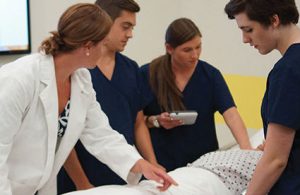
A Way to Leave Burnout Behind:
It’s no secret that clinical nursing in a hospital environment in particular takes a real physical and mental toll. Nurses who have been caring for patients in a hands-on way for years say one of the top reasons why to become a nurse educator is to get time to recharge a bit and avoid any further burnout. Nurse educators often tend to work fewer nights than floor nurses.Click To A Select List Of Online Masters in Nurse Education Programs
Nurse Education Can Be Fun:
There’s no guarantee you’ll love teaching, but many nurses report that they get real pleasure out of educating younger RN’s. It can be a nice way to use all the experience you’ve accumulated to help others who are new to nursing. Teaching or precepting can be a pleasure if you enjoy imparting wisdom.A Graduate Degree is Often, But Not Always, A Requirement:
Many nurses feel it’s possible to be a great nurse educator with any master’s degree in nursing, or even with a basic BSN. But nurse educator degrees were developed largely to create some standardization in how young nurses area trained. As a bedside nurse, you may have ample knowledge to impart, but there are techniques that can help you be more effective in your teaching. The MSN in nurse education is designed to give you those techniques.Faster Path To Certification:
In many locations, you are able to sit for your exam in nurse educator sooner – often with two years teaching experience – than if you have a general MSN degree without the education focus. It can often require five years experience to take the certified nurse educator exam if you don’t have the specialized degree. If you love the idea of teaching, a nurse educator degree might open some exciting doors for you. What does it take to be a great nurse educator? Some key attributes include:- The ability to communicate clearly. Teaching is obviously all about communicating. It’s important to enjoy that process if you want to succeed in this specialty.
- A love of learning. It’s not only important that your students get up to date. You need to keep your knowledge fresh if you want your students to respect you.
- Compassion for the students. It can be tough to become successful as a new RN. Having empathy for your student’s problems can be a help.
- Lastly: A sense of humor. Knowing how to have a good laugh now and then can make the teaching experience much more uplifting for your students – and for you as well.
Master’s Degree Programs Online In Nurse Education
Purdue University Global
A very large and well-known school with over 40,000 students on 11 campuses and in a large online degree program, and quality accreditation. Kaplan has kept its tuition fees in a relatively moderate range, and it accepts credit transfer for previous schoolwork:
Get free info on Purdue University Global’s Master’s in Nurse Education program
Grand Canyon University
A large private school offering online degrees at a relatively moderate price for a school with strong name recognition across the country. Grand Canyon offers bachelors and masters degrees in varied nursing specialties.
Get info on Grand Canyon University’s MSN Nurse Education program
Liberty University
Liberty is a large, well-known school that offers a variety of online degree programs at all levels in business, education, criminal justice, health care, psychology and more.
Get information on Liberty’s MSN: Nurse Educator Track program
Sacred Heart University: Master of Science in Nursing, Nursing Education

 Online colleges and universities today usually have very welcoming policies toward undergrad transfer students. But what if you’re in the middle of a nursing master’s degree program and want to transfer the credits you earned to another nursing school?
The good news is that many
Online colleges and universities today usually have very welcoming policies toward undergrad transfer students. But what if you’re in the middle of a nursing master’s degree program and want to transfer the credits you earned to another nursing school?
The good news is that many 
